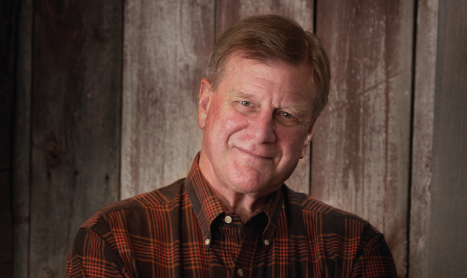On a day once called ‘Decoration,’ thoughts on what's left behind
As has been our custom for years, my wife, Kathy, and I take time over Memorial Day weekend to plant geraniums on my parents’ graves. The stones are black granite, with the inscriptions sand-blasted gray in a formal Roman type face. The bright-red geraniums provide a nice contrast with the black.
We pull up the dandelions and other weeds, rake up the hickory nut shells, turn over the dark brown soil and water in the geraniums. And then we sit on the big rock under a tree and talk about memories and memorials and cemeteries and family.
Kathy’s father, Walter, is buried near the southern Wisconsin town of Clinton, where he farmed until he lost his right hand in a farming accident. The grave is under a big white oak on top of a hill; you can see the well-kept farms and rolling hills in the distance.
We planted daylilies there when he was buried, but we have not been back to see if the grave has been properly tended. Like many children who have moved away from their parents’ hometowns, we have pangs of regret at his untended grave.
Both Kathy’s grandparents on her mother’s side came over from Norway in the latter part of the 19th century. As was the pattern then, one of every two early Norwegian immigrants arrived in southern Wisconsin, to be followed by others who felt less anxiety in a new country now that countrymen had come and flourished there.
Many years ago, my father took me to the old Quaker cemetery in Farmington. My great-great-great-great-great grandfather, Arthur Power, founded the town back in 1824. He came from another Farmington, that one in upstate New York. Once the Erie Canal was under way, he jumped at the chance to get to the Michigan frontier, arriving even before the canal was actually finished.
The Powers prospered there. Some 70 years later, his grandson, Eugene Power, moved to Elk Rapids, near Traverse City, where he was one of the first to plant cherries in the sandy soil, where the nearby warm water holds back blossom-killing early frosts.
Today, of course, cherries are a major crop in that part of the world.
My grandfather, Glenn Power, moved from the family orchard into Traverse City, where he became a civic force in town, founding among other things, the Park Place Hotel. He is buried in the local cemetery, together with other family members.
My father and mother both attended the University of Michigan. After they were married, they decided to settle in Ann Arbor, a town they liked, figuring they’d get jobs to support themselves after they got settled. Many young people do that these days, but back then it was regarded as close to irresponsible, if not dangerous.
When my mother died, my father had twin grave stones prepared, one with my mother’s dates and one blank, to be inscribed after he died. Eventually, we buried their ashes on a cold rainy afternoon with the black-clad rector of our church reciting the burial service for the dead. When we poured my mother’s and father’s ashes into the fresh earth, they swirled up in a great spiral, as though their vigorous spirits couldn’t abide being kept down.
When our time comes, Kathy and I expect we’ll be buried at the Forest Hill Cemetery, next to my parents. We, too, will follow the black granite gravestone style and Roman type face I established.
But it remains to be seen if there will be anybody around to tend our graves, plant the red geraniums and pull up the weeds. One of our sons lives in Denver and the other in Shanghai; we don’t want to impose on them or on the lives they’ve chosen to live.
Yet we can’t help but wonder what their and our futures will hold, feeling a little sad, a little resigned.
And, sitting on that rock last weekend, I remembered the last lines of a poem, “Thanatopsis,” by the American poet William Cullen Bryant (1794-1878), which my ninth-grade English teacher, Helen Ryder, made me memorize more than six decades ago.
So live, that when thy summons comes to join
The innumerable caravan which moves
To that mysterious realm, where each shall take
His chamber in the silent halls of death,
Thou go not, like the quarry-slave at night,
Scourged to his dungeon, but, sustained and soothed
By an unfaltering trust, approach thy grave
Like one who wraps the drapery of his couch
About him, and lies down to pleasant dreams.
Editor’s note: Former newspaper publisher and University of Michigan Regent Phil Power is a longtime observer of Michigan politics and economics. He is also the founder and chairman of the Center for Michigan, a nonprofit, bipartisan centrist think–and–do tank, designed to cure Michigan’s dysfunctional political culture; the Center also publishes Bridge Magazine. The opinions expressed here are Power’s own and do not represent the official views of the Center. He welcomes your comments via email.
See what new members are saying about why they donated to Bridge Michigan:
- “In order for this information to be accurate and unbiased it must be underwritten by its readers, not by special interests.” - Larry S.
- “Not many other media sources report on the topics Bridge does.” - Susan B.
- “Your journalism is outstanding and rare these days.” - Mark S.
If you want to ensure the future of nonpartisan, nonprofit Michigan journalism, please become a member today. You, too, will be asked why you donated and maybe we'll feature your quote next time!


 Phil Power is founder and chairman of the Center for Michigan.
Phil Power is founder and chairman of the Center for Michigan.